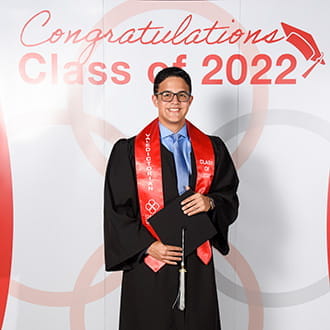We use cookies to improve your online experiences. To learn more and choose your cookies options, please refer to our cookie policy.

Hey everyone! I'm Kourosh, valedictorian of SISD class of 2022. I studied Math AI, Physics, and Arts HL; my SLs were Business, French B, and English. This August, I'll begin a new journey, studying Computer Science and Aerospace Engineering at Georgia Tech, Atlanta, US. Whether you're the class of 2023 or 24 or someone who stumbled onto this, I'm very sure that one thing is unchanged: university applications are still nerve-racking! Even if you're taking a year off, starting your own business, or pursuing a career, you might find a few nuggets of information that will help you.
Let's look at the big questions you'll have to tackle for university. Which country, university, and major? Although my major was the most critical factor for me, choosing it wasn't as cut and dry as picking out the best one straight away. I spent half of my junior year developing my portfolio to study animation, yet, six months later, I was applying for software programming internships. The moral is: Don't be discouraged if you don't pick the right subject for you on the first go. Keep in mind that some universities allow you to change majors, even after being accepted. So, focus on one of the three components I've named above and build on that. Other tips for choosing a major that helped me are doing online quizzes and reading a book or two on the subject. I can't emphasize how much reading will help you make a more informed decision about your university choice. Once you find the right book, you'll see that it will help you determine what to study. Even though subject books are often dry, conversational ones manage to give you much information.
Finally, and perhaps most importantly, try as hard as possible to get an internship in a field that interests you. Experiencing your future career can motivate you or nudge you to a career path that suits you better. If you have to take a standardized test, make sure you work extra hard, spending at least an hour every other day studying for them. Consult your teachers too. They will provide you with helpful resources. If possible, they will be more lenient in giving you less homework as the date of your exam approaches. Make sure you give yourself plenty of extra time, so if you have to be finished with your ACT or SAT by June, do it once in January, so you'll be able to retake it if you're not pleased with your score. Sometimes, the exams allow you to SuperScore, combining the best score from individual exams.
I applied to the US and UK, so I can only speak about their processes. For UK applicants, keep your IB scores sky high and spend a great deal of time crafting your Statement. Show the universities that you're interested in your majors' theoretical and practical aspects. Complete an EDX or Coursera online course on your subject if you find the time. For US applicants, you might need to write as much as 2,500 words for one university, excluding your Common App essay, so make sure you plan everything. Ideally, you should finish all of your essays before your senior year. Also, double-check all the deadlines for your financial documents, Early Action, Early Decision, Regular Decision, and Rolling Decision applications. Spend a lot of time on your Common App, and make sure you ask your university counselor for their feedback on your essays. I would suggest TickTick, a daily planning app on the App Store, to track your deadlines. Run your essays through Grammarly and every other service you can find. Don't miss a comma on your final submission as I did. I managed to fix it because I hadn't sent it yet, due to some double approval, but, trust me, not a pleasant experience.
I might be sending mixed signals, but also make sure that you spend time enjoying your last two years. My biggest regret is not spending enough time with my friends, some of whom I might not see for years to come. It's really easy to go into autopilot and keep piling up work and filling every day with extra work. The IB system is truly incredible because it pushes you to develop an extracurricular portfolio, which is priceless, especially for the US and the UK. Your extracurriculars should reflect your interests but also be diverse. I've already discussed a few possibilities like online courses and internships. Still, you can also join a sports team or various clubs throughout the school. Ms. Fitzgibbons and Ms. Furr have also worked very hard to initiate the Student Leadership Team. It is truly a fantastic opportunity for any student to show desired traits like being a leader, problem-solver, and collaborator to universities.
Good luck with your university applications or whichever pathway you take after SISD!